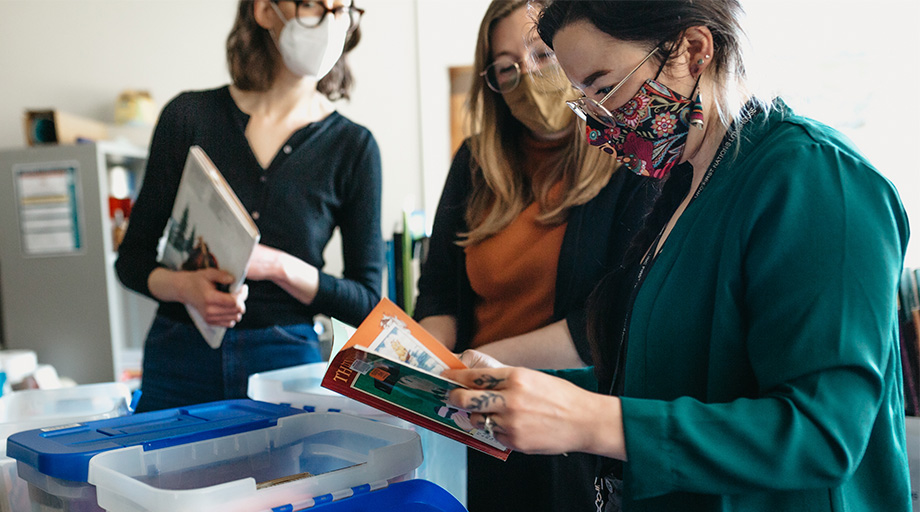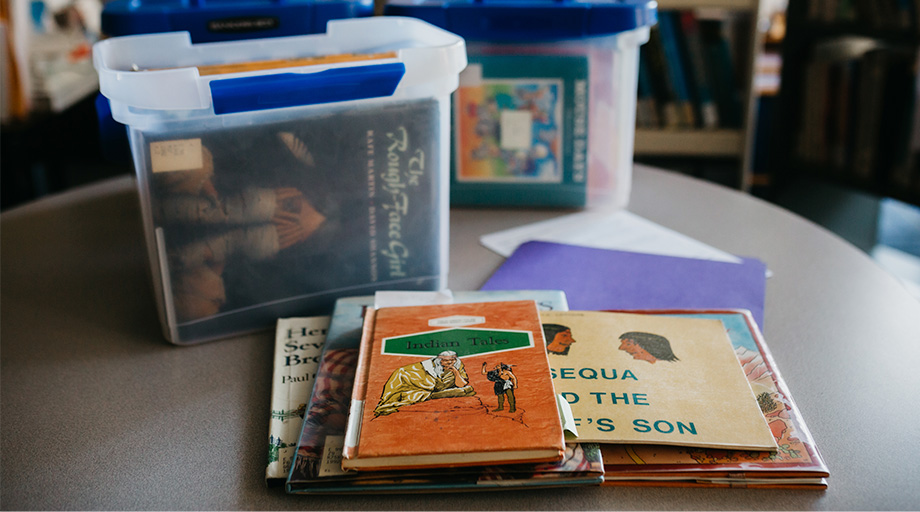
What do you do with problematic materials in a library collection—with books that are outdated, that perpetuate stereotypes, depict cultural appropriation, or include racism and other harmful elements?
This was the question faced by librarians at UBC Vancouver’s Education Library, Xwi7xwa Library and UBC Okanagan (UBCO) Library, who found a way to contextualize problematic books from the children’s picture book collections.
“Because we serve so many competing interests—like the Teacher Education program, the History of Education program, and children’s literature [research]—we certainly didn’t want to remove these items entirely,” says Wendy Traas, Education Librarian at the Education Library. “I think we landed on something really innovative to mediate access to these materials through the lens of critical literacy.”
Critical Indigenous Literacy for young learners
For educators, critical literacy is a way of approaching a text to examine its underlying biases and help students better understand the political, social, cultural and economic contexts in which a text was created.
“Critical literacy requires us to go beyond what we read on the page and to consider the larger narrative in which a text is situated, asking questions about who created a text and why,” writes Karleen Delaurier-Lyle, Information Services Librarian at Xwi7xwa Library. “Critical Indigenous literacy asks us to think about authorship and identity in relation to the stories and teachings we trust as readers. It also asks readers to think critically about Indigenous representations (or lack thereof) within a text.”
The Indigenous Children’s Books and Critical Literacy (ICBCL) project began as a pilot at the Education Library in 2019. Selected children’s picture books were grouped together into critical literacy kits, with each kit focusing on a unique theme. The kits are supplemented with suggested resources, further reading for instructors, and printouts of guiding questions to encourage classroom discussion.
In 2020, this model was adapted by librarians at Xwi7xwa Library and UBC Okanagan Library, who began making digital kits available online. In early 2021, the project team published a working model that other institutions could adapt for their own collections.
Today, there are ten Critical Indigenous Literacy kits available across three branches, that approach topics like cultural appropriation, myth and folklore, and residential schools.

Physical versions of some of UBC Library’s Critical Indigenous Literacy Kits are available to borrow at Education Library.
Creating accountability at the Education Library
While it may be easier to simply weed out problematic books from a library’s stacks, this isn’t always the best solution.
“Removing these books doesn’t do a lot to educate people about why books like that get written. And they are not all older books,” says Emily Fornwald, Education Librarian at the Education Library, noting that some of the problematic books included in the critical literacy kits were published as recently as 2015. Fornwald hopes that, through the kits, library users can learn how to navigate the collection more critically themselves, without having to rely on librarians to select and vet each text.
“It’s also a matter of us having accountability—as a profession and as a library,” says Fornwald, noting that it was important for the Education Library to acknowledge that these problematic books are on their shelves because they were selected and purchased by the library.
Identity and Indigenous-authored resources at Xwi7xwa Library
“We have a lot of folks that will come into the branch thinking that every single resource has been vetted as appropriate,” says Delaurier-Lyle, noting that while the materials in Xwi7xwa’s collections are Indigenous-authored, there is nuance when it comes to a person’s identity, and authenticity can be called out in very specific ways.
“We care about who the author is—their identity and belonging and community or nationhood—and also the stories that they’re telling,” says Delaurier-Lyle.
The Education Library had a great framework, she continues, but the model also needed to be adapted to Xwi7xwa’s specific users. For their children’s literature collection, that includes scholarly researchers, school librarians, teachers, and sometimes parents and caregivers from the community. “[In our kits]. we tried to make sure that we weren’t limiting it to just our main patron base, because it didn’t make sense to do all this work without it being able to serve multiple needs.”
New teaching resources for classrooms at UBCO Library
UBCO Library’s Curriculum Collection is large, with more than 3,000 titles that include a mix of children’s books and teaching materials received as donations or from the college system.
When Sajni Lacey, Learning and Curriculum Support Librarian at UBCO Library, started to dig deeper into the Indigenous children’s picture books, she saw an opportunity to take a structured approach to the collection. She also wanted to create new classroom resources that supported UBCO’s Bachelor of Education program, which aims to incorporate Indigenous knowledge systems into their teacher candidate training.
“I thought, ‘here’s some great examples of what Vancouver is doing and here’s how we can start approaching it here in the Okanagan’. I had a couple of faculty members who are on board with piloting different iterations of this content,” says Lacey. “This project was a great multi-branch effort that I think is meaningful in the context of decolonization and reconciliation, which we’re all working towards.”
Learn more about UBC Library’s Critical Indigenous Literacy kits.
This project is part of UBC Library’s strategic direction to engage with communities.
Learn more about our Strategic Framework.
